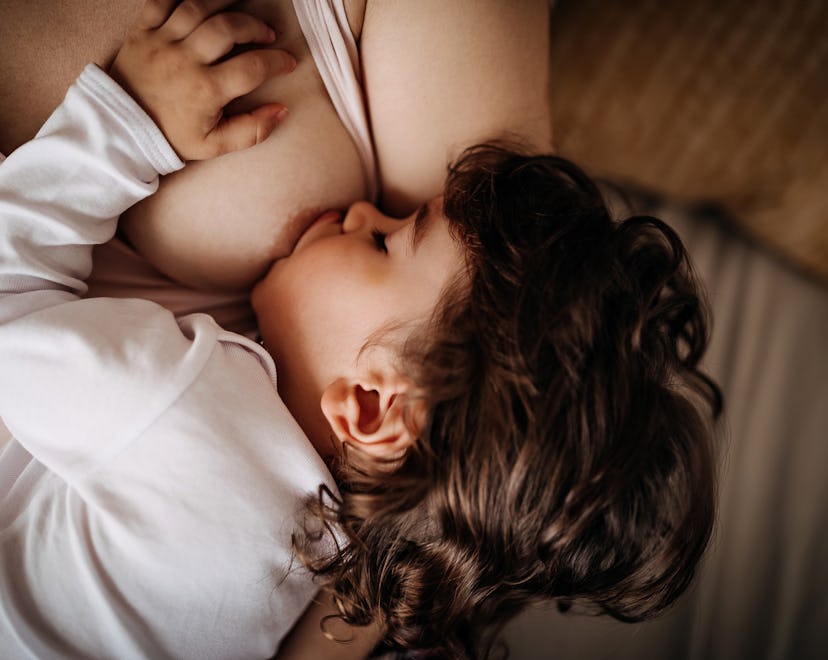Breastfeeding

Everything To Know About Contractions During Breastfeeding
Unnerving? Yes. Dangerous? Probably not.
It’s a common experience for new parents: You’ve just given birth, and gone through hours (maybe days) of contractions. But finally, your baby is born. And then a day or so later, you’re breastfeeding your newborn and are suddenly feeling a familiar pain in your abdomen. What gives? Breastfeeding contractions are often an unwelcome surprise, particularly if you’re just getting the hang of breastfeeding.
In my own experience, I came home from the hospital after giving birth to my daughter and warily approached the breast pump that had been sitting in my closet, curious but nervous to try out this strange machine. I worried it was going hurt my nipples, which were already none too happy after trying to work with my newborn’s latch. But when I turned on the machine, I was suddenly in teeth-gritting pain — not from my nipples, but from some unexpected contractions that took my breath away. It didn’t last long, but it was certainly a surprise. What cruel joke of biology makes you feel like you’re in labor just when you already had a baby? What does it mean if you’re feeling contractions while breastfeeding a newborn? What about if you’re feeling contractions while breastfeeding during pregnancy? Two experts had the answers.
Can breastfeeding cause contractions?
In short, yes, breastfeeding can cause uterine contractions. This can happen during pregnancy or postpartum. If you’re feeling contractions while breastfeeding within a few days of giving birth, that means your body is working as expected. During pregnancy, your uterus stretches and grows, from the size of a grapefruit in your first trimester to the size of a watermelon in your third. But it’s not like it just snaps back into place the moment your baby is out into the world. Instead, it takes a while to return to its normal size and place in your body, and breastfeeding can help process that along. Contractions after birth are “a necessary process after birth which causes the uterus to shrink and close blood vessels between the uterus and placenta,” explains Allison Walsh, an International Board-Certified Lactation Consultant. Within 24 hours, your uterus will return to the size of a grapefruit, and it will contract back down to its normal size — roughly the size of your fist — in four-to-six weeks, Walsh tells Romper. Breastfeeding releases oxytocin that can bring on those contractions, helps that process of getting your uterus back to its normal size and the place where it belongs.
What do breastfeeding contractions feel like?
It’s hard to precisely explain what a contraction feels like until you’re in the midst of one (and even then, describing the feeling accurately probably isn’t the first thing on your mind) and breastfeeding contractions can vary widely. Sometimes called “after pains,” breastfeeding contractions can range from some light postpartum cramping to doubled-over-in-pain, depending on a variety of factors. They are often be worse for second-time parents than first-timers, and may get worse after each birth. “After a first baby, most people perceive contractions like cramps (maybe like early labor),” Walsh tells Romper. “People that have given birth several times can experience contractions that are very painful immediately after birth (more like intense labor).” Luckily, whatever the level of pain, postpartum contractions while breastfeeding don’t typically last long.
Can breastfeeding cause contractions if you’re pregnant and breastfeeding?
If you’re experiencing contractions while breastfeeding your newborn, it may be painful but there’s no reason to worry: You definitely know you’re not in labor, because your baby is in your arms. But what if you have contractions while breastfeeding an older child during pregnancy? Should you be concerned that breastfeeding contractions could lead to miscarriage or preterm labor?
In most cases, you don’t need to worry, says Dr. Sonal Patel, a family medicine physician in Seattle. “For people who experience contractions during a pregnancy if they are breastfeeding a sibling, I would encourage them to speak with their obstetrics provider to determine if there is a concern for preterm labor. Generally speaking, breastfeeding during a pregnancy may be safe and should not lead to painful contractions. It is generally safe to breastfeed during a subsequent pregnancy, as well as ‘tandem’ breastfeed an older infant along with a newborn,” she says.
Particularly if you know that you have specific risk factors for pregnancy loss or preterm labor, you should check in with your doctor about contractions triggered by breastfeeding. “Those who would like to continue to breastfeed an older child should discuss the potential risks and benefits with their OB-GYN provider,” Patel explains. Continuing to nurse an older child may make it slightly more difficult to conceive his or her younger sibling. However, breastfeeding is not a reliable form of birth control, and you can absolutely become pregnant and stay pregnant while breastfeeding. Many parents continue to breastfeed all through pregnancy and after. “Throughout time and culture, toddlers have been nursed during pregnancy, and tandem nursing of the toddler and newborn was commonplace,” Walsh says.
In short, though we think of contractions as something that just happens during labor, you can have contractions long before labor and long after and they can be triggered by breastfeeding. Braxton-Hicks contractions can start months before labor, and “after pain” contractions may continue for several days after your baby is born. It’s all just part of your body doing its thing. The pain of contractions is no one’s favorite part of having a baby, but it is kind of cool that our bodies can multi-task like that: Feeding your baby and getting your organs back in their rightful place, all at the same time.
Sources:
Allison Walsh, international board-certified lactation consultant, birth educator, and postpartum doula
Dr. Sonal Patel, M.D., family medicine physician at Pacific Medical Centers
This article was originally published on